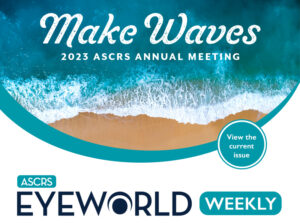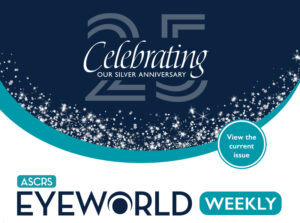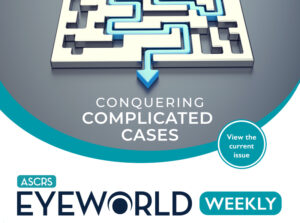FDA agrees to special protocol assessment for AMD clinical trial
Outlook Therapeutics announced that the FDA provided written agreement under a special protocol assessment (SPA) for a clinical trial protocol to evaluate ONS-5010 for treatment of AMD. According to the company’s press release, if the trial is successful, “it would satisfy the FDA’s requirement for a second adequate and well-controlled clinical trial to address fully the clinical deficiency identified in the Complete Response Letter” issued by the FDA last year. The trial will be a randomized, controlled, parallel-group, masked, non-inferiority study, enrolling about 400 patients with newly diagnosed wet AMD. The participants will be randomized 1:1 to receive 1.25 mg ONS-5010 or 0.5 mg ranibizumab intravitreal injections at day 0, week 4, and week 8. The primary endpoint will be mean change in BCVA from baseline to week 8. Topline results and resubmission to the FDA for ONS-5010 BLA is expected by the end of the year, according to the company.
Topline data from Phase 2 trial evaluating suprachoroidal wet AMD treatment
Regenxbio announced positive interim data from its Phase 2 trial evaluating ABBV-RGX-314 as a single gene therapy treatment for wet AMD. According to the company’s press release, the ABBV-RGX-314 therapy continues to be well tolerated in the more than 100 patients who have been randomized to receive one of three dose levels. More than 50 patients in the third dose have demonstrated the highest reduction in anti-VEGF treatment burden: an 80% reduction in annualized injection rate and 50% injection free.
First patient dosed in Phase 1 DME treatment study
Inflammasome Therapeutics announced that it dosed the first patient in its Phase 1 investigator-sponsored clinical trial evaluating the dual inflammasome inhibitor K8 (a kamuvudine) as a possible treatment for DME. This first-in-class trial targets inflammasome activation, which the company states is believed to be associated with DME. The 24-week study will evaluate mean change in central subfield thickness from baseline, mean change in BCVA, and adverse events. The K8 inflammasome inhibitor in the study is being administered via a sustained-release implant.
Study: new gene variants contributing to glaucoma susceptibility identified
A “mega-analysis” conducted by researchers at the University of Pennsylvania and published in the journal Cell identified three gene variants that could be contributing to increased susceptibility for people of African ancestry to develop glaucoma. According to the study, which involved more than 11,200 people, two variants in particular are correlated with primary open-angle glaucoma (rs1666698, associated with DBF4P2, and rs34957764, associated with ROCK1P1). The third variant (rs11824032, associated with ARHGEF12) was associated with cup-to-disc ratio.
ASCRS news and events
- ASCRS Annual Meeting: The Preview Program for the ASCRS Annual Meeting, April 5–8 in Boston, Massachusetts, is now available online. Find it, registration information, and more here.
- Eyecelerator @ ASCRS: Eyecelerator, a partnership between ASCRS and the American Academy of Ophthalmology, is bringing back The Winning Pitch Challenge to Eyecelerator @ ASCRS, April 4, in Boston, Massachusetts. Submissions for The Winning Pitch Challenge are being accepted now through February 2. Cash prizes for winners are worth up to $25,000. Find more information on submissions here.
Research highlights
- A prospective interventional cohort study evaluated the safety and efficacy of the ND Ring for prevention/treatment of negative dysphotopsia. The study published in the Journal of Cataract & Refractive Surgery included 22 patients who had no other structural ocular pathologies. Fifteen eyes received the ring after cataract surgery to treat ND, serving as a therapeutic group, and seven eyes were implanted with the ring during cataract surgery, serving as the prophylactic group. Patients were interviewed preoperatively about their visual complaints, and postop interviews were conducted to “confirm resolution of complaints related to ND.” Follow up was at least a year. The authors reported that 14 of the 15 eyes in the therapeutic group achieved “complete resolution of ND on the first postoperative day.” They also reported no ND in patients who received the ring prophylactically at the time of cataract surgery. There were no significant adverse intraoperative events, but the authors did note two cases of vitreous upthrust. There was not a permanent drop in visual acuity in the therapeutic group.
- A study published in the journal of Clinical Ophthalmology assessed the tolerance of experimentally induced astigmatism when patients had bifocal, trifocal, and extended depth of focus IOLs. The study included 70 eyes of 70 patients who had these types of IOLs. The investigators induced astigmatism with positive cylindrical lenses at increments of 0.5–2.0 D at the 90- and 180-degree axes over the patient’s best distance correction. They found that distance and near visual acuity worsened with increasing magnitude of astigmatism, except in the EDOF group. In this latter group, the authors reported that near visual acuity “remained within a clinically acceptable limit (within 1 line from BCVA).” The investigators also found that the EDOF group had the “highest astigmatic threshold for losing VA lines following experimental astigmatic induction at both distance and near.” Visual acuity was less affected by with the rule astigmatism, especially at distance, in all three IOL groups. The study proposes residual astigmatism thresholds for all three IOL groups.
Product news
- The RayOne EMV (Rayner) received approval from Health Canada.
This issue of EyeWorld Weekly was edited by Stacy Jablonski, Liz Hillman, and Ellen Stodola.
EyeWorld Weekly (ISSN 1089-0319), a digital publication of the American Society of Cataract and Refractive Surgery (ASCRS), is published every Friday, distributed by email, and posted live on Friday.
Medical Editors: Sumit “Sam” Garg, MD, Chief Medical Editor, Mitchell Weikert, MD, Cataract Editor, Karolinne Rocha, MD, PhD, Refractive Editor, Julie Schallhorn, MD, Cornea Editor, Manjool Shah, MD, Glaucoma Editor
For sponsorship opportunities or membership information, contact: ASCRS • 12587 Fair Lakes Circle • Suite 348 • Fairfax, VA 22033 • Phone: 703-591-2220 • Fax: 703-591-0614 • Email: ascrs@ascrs.org
Mention of products or services in EyeWorld Weekly does not constitute an endorsement by ASCRS.
Click here to view our Legal Notice.
Copyright 2024, EyeWorld News Service. All rights reserved.




